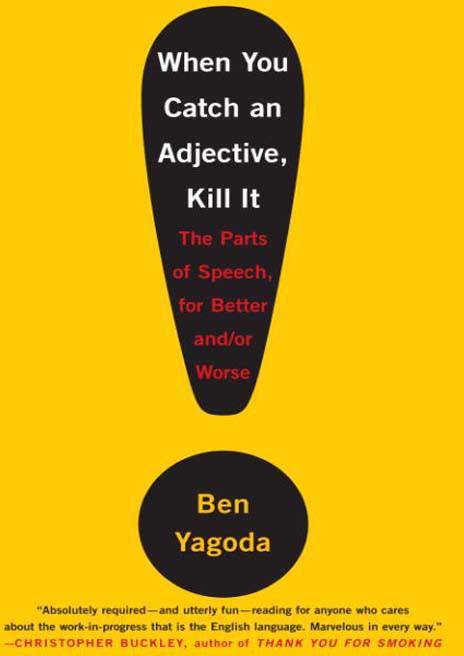When You Catch an Adjective, Kill It: The Parts of Speech, for Better And/Or Worse by Ben Yagoda

Author:Ben Yagoda [Yagoda, Ben]
Language: eng
Format: epub, mobi
Tags: Retail, Grammar, Reference
ISBN: 0767920783
Publisher: Broadway
Published: 2007-01-01T15:00:00+00:00
CHAPTER VI
N.
Generally speaking, things once they are named the name does not go on doing anything to them and so why write in nouns. Nouns are the name of anything and just naming names is alright when you want to call a roll but is it any good for anything else. To be sure in many places in Europe as in America they do like to call rolls…. Nouns as I say even by definitionare completely not interesting.
—Gertrude Stein, “Lectures in America”
HAMLET: There are more things in Heaven and
earth, Horatio,
Than are dreamt of in your philosophy.
—Shakespeare, Hamlet, Act I, Scene 5
Anyone, anywhere, anytime, who has made a list of the parts of speech has included on it nouns. They are the one kind of word without which communication is unimaginable. Their sheer inevitability makes defining them tricky. The elementary school definition most of us remember—a word that signifies a person, place, or thing—is more or less correct, if you accept that beauty, running, health, entrance, confusion, and similar words signify things. Grammarians and linguists prefer to define word classes by what they do. Nouns, unlike other parts of speech, can perform the following functions: occur after an article, determiner, or adjective; take a possessive ’s and plural s; and act as the subject or direct object of a sentence. Not all nouns can do all these things. For example, in the sentence “Jeff is happy,” Jeff is a noun but can’t be preceded by a determiner or adjective. We normally talk about “the family car” rather than “the family’s car,” even though family is a noun and in this case the family can be said to possess the car. Adding one sheep to another sheep gives you two sheep, not two sheeps. And the subject of the sentence “Well-behaved campers will eat first” is not the word campers, but rather the noun phrase well-behaved campers.
Any word can be a noun, when it’s referred to as a word—as when I might say to a student, “There are seventy-three likes and forty-one awesomes in your paper, Mr. Jones, and that’s way too much.” That’s admittedly a parlor trick, but you can make virtually every adjective into a common noun by sticking a the in front of it. Doing that with the ten most frequently used adjectives—the other, the good, the new, the old, the great, the high, the small, the different, the large, and the local—produces something that sounds like a Bible verse. Adding -ing to a verb creates a noun (“Seeing is believing,” “Parting is such sweet sorrow,” “Breaking up is hard to do”). And common verbs are nouned with blinding frequency: the list starts with (having a) say, make (as in a brand of car), (giving it a) go, look, use, find, work, need, feel, show, try, call, hold, and help, and continues on for quite a long time indeed, up to recent and widely criticized noun coinages like startup, redo, and get (TV news talk for a highly sought-after interviewee).
Download
When You Catch an Adjective, Kill It: The Parts of Speech, for Better And/Or Worse by Ben Yagoda.mobi
This site does not store any files on its server. We only index and link to content provided by other sites. Please contact the content providers to delete copyright contents if any and email us, we'll remove relevant links or contents immediately.
| Coloring Books for Grown-Ups | Humor |
| Movies | Performing Arts |
| Pop Culture | Puzzles & Games |
| Radio | Sheet Music & Scores |
| Television | Trivia & Fun Facts |
The Infinite Retina by Robert Scoble Irena Cronin(6241)
Harry Potter and the Cursed Child: The Journey by Harry Potter Theatrical Productions(4501)
The Sports Rules Book by Human Kinetics(4379)
Molly's Game: From Hollywood's Elite to Wall Street's Billionaire Boys Club, My High-Stakes Adventure in the World of Underground Poker by Molly Bloom(3531)
A Knight of the Seven Kingdoms by George R R Martin(3333)
How To by Randall Munroe(3106)
Flowers For Algernon by Daniel Keyes(3100)
Quidditch Through the Ages by J.K. Rowling(3100)
Quidditch Through the Ages by J K Rowling & Kennilworthy Whisp(2966)
Stacked Decks by The Rotenberg Collection(2880)
Quidditch Through the Ages by Kennilworthy Whisp by J.K. Rowling(2858)
Quidditch through the Ages by J. K. Rowling(2792)
776 Stupidest Things Ever Said by Ross Petras(2775)
Quidditch Through The Ages by J. K. Rowling(2761)
Ready Player One: A Novel by Ernest Cline(2717)
What If?: Serious Scientific Answers to Absurd Hypothetical Questions by Randall Munroe(2700)
Beautiful Oblivion by Jamie McGuire(2602)
The Book of Questions: Revised and Updated by Gregory Stock Ph.d(2567)
Champions of Illusion by Susana Martinez-Conde & Stephen Macknik(2448)
